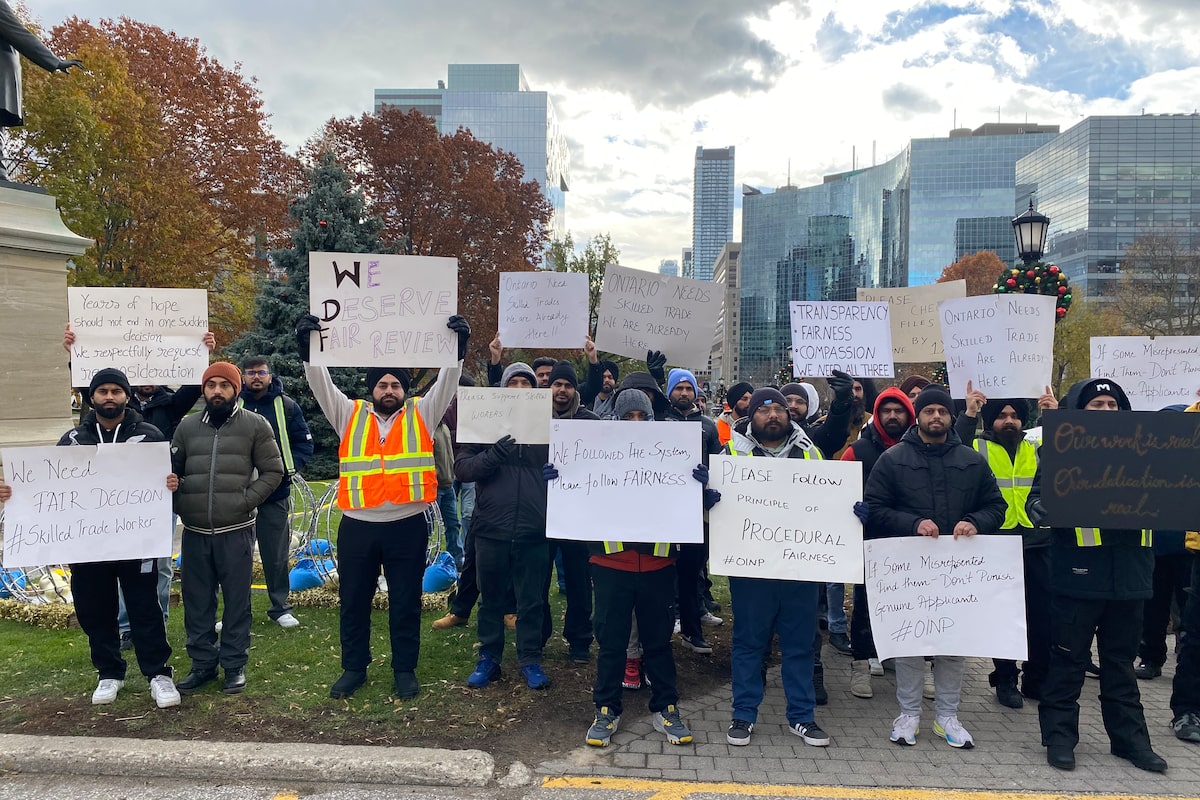Tradespeople gather outside Queen’s Park to protest the Ontario government’s decision to suspend the Ontario Immigrant Nominee Program’s skilled worker stream, which was aimed at addressing the province’s labour shortages.Laura Stone/The Globe and Mail
Ontario has quietly suspended a fast-track immigration stream for skilled tradespeople and is cancelling all current applications to the stream, leaving candidates who were awaiting decisions in limbo − and at risk of losing their right to live and work in the province.
The Ontario Immigrant Nominee Program (OINP) allows the province to recruit and retain foreign workers by granting permanent residency to those with in-demand skills, and has previously been touted as a critical means of filling labour shortages. Qualified workers can be nominated by employers or invited by the province to apply based on their skill set.
Last year, the province nominated about 4,100 candidates through its skilled worker stream − with the Labour Ministry describing the OINP as the “best tool the province has” to fill job gaps. The government has previously forecast that it will need 100,000 skilled tradespeople over the next decade to meet its infrastructure goals.
But the Labour Ministry’s oversight of the program has also attracted scrutiny from the province’s Auditor-General’s office, which last year identified weaknesses in detecting “integrity concerns.”
On Friday, an update posted to the OINP website said an internal review of the skilled trades initiative had “identified systemic misrepresentation and/or fraud,” prompting the Labour Ministry to suspend the stream.
That afternoon, candidates were notified by a director at the Labour Ministry that their applications had been terminated, according to a ministry e-mail obtained by The Globe and Mail.
The Ontario government’s move has triggered two days of protest outside the Labour Ministry and Queen’s Park by skilled trade applicants who say they were blindsided by the policy shift.Laura Stone/The Globe and Mail
The e-mail says all candidates with outstanding applications will be refunded their application fee, and those who meet the eligibility criteria for other OINP streams can reapply. (Successful candidates who have already been granted permanent residency status do not appear to be affected).
The move has spurred two days of protest outside the Labour Ministry and Queen’s Park by skilled trade applicants who say they were blindsided by the policy shift and fear they will lose their ability to live and work in Ontario.
Jagjeet Singh told The Globe he came to Ontario as an international student in January 2021, and after receiving a temporary work permit, was hired as a carpenter at a Windsor-area company that performs emergency property restoration and renovation.
After submitting an expression of interest to OINP’s skilled trades stream, he was invited by the provincial Labour Ministry to apply and has been waiting for two years for approval, he said.
“After giving false hope to everybody, they suddenly revoke everything.”
The Ministry of Labour did not respond to questions from The Globe by deadline.
NDP MPP Alexa Gilmour said about 2,600 skilled worker applicants were awaiting approval as of last month, according to a freedom-of-information request filed by an immigration consult who has been assisting some candidates. She said the program suspension has been “devastating” for workers who applied in good faith.
“At the core of this there are human beings with specialized skills,” she said. “We have simply abandoned them without enough clarity and with no pathway forward.”
Last year, a report from the province’s Auditor-General identified numerous flaws in the OINP program, including weak oversight. The report found, for example, that inspectors tasked with program enforcement recommended the Labour Ministry issue fines to 72 applicants and 256 employers or immigration consultants.
To boost productivity, more young Canadians must go into the skilled trades
By the following year, the Labour Ministry had penalized nine applicants and 34 employers or consultants for issues such as failing to provide accurate information.
The report also identified the skilled trades stream as a high-risk area. Unlike other streams, it did not require nominees to be working in their approved trade at the time of application.
The Auditor-General’s report said this made it difficult to verify workers’ job experience – an issue compounded by the fact that labour inspectors did not have the legal authority to conduct inspections of employers in the skilled trades stream.
The report recommended the stream be reformed to require that workers have a job offer in an approved role or be actively employed in an approved position at the time of their nomination.
Mr. Singh says he already met the latter criterion, since he is employed alongside several other workers who received permanent residency at the same employer through the OINP. He said candidates should have been interviewed to verify their documentation, rather than see their applications abruptly cancelled by the ministry.
“It’s really a mess created by them,” he said.
